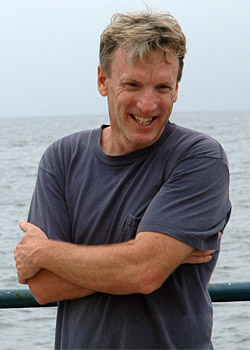Daniel J. Repeta
Our research emphasizes marine organic carbon and nutrient cycles, and how these cycles regulate microbial processes in the ocean. We isolate and characterize new, biologically active organic compounds from seawater using advanced chemical and microbial techniques. Currently, Marie Curie Postdoctoral Fellow Mar Nieto-Cid and Dan Repeta are working to extract and identify the organic ligands that bind > 99% of the iron and other trace metals in seawater. Metal-organic complexation has been proposed as an important mechanism by which marine microbes regulate the bioavailability of scarce trace metals over large portions of the global ocean, but so far we have yet to identify what these ligands are, or the organisms that make them. We have collected samples on two cruises to the Eastern Tropical Pacific Ocean using a custom-built trace metal and organic clean extractor and are beginning to identify iron ligand complexes using high resolution mass spectrometry.
Open ocean primary production is often limited by the very low concentrations of phosphorus (P) and nitrogen (N) that are characteristic of these sites. Most P and N in the sunlit portion of the ocean are locked away in dissolved organic compounds, and up to half of total marine production may be driven by the cycling of these organic nutrients. Travis Meador, a WHOI Postdoctoral investigator is synthesizing polystyrene beads coated with very surface active iron oxyhydroxides to concentrate organophosphorus compounds from seawater and laboratory cultures of key microbes. Seawater concentrates are then analyzed by high pressure liquid chromatography-mass spectrometry as well as nuclear magnetic resonance spectroscopy to characterize the natural suite of organophosphorus compounds.
Jamie Becker, a WHOI/MIT Joint Program student is beginning a study of how organic matter composition impacts microbial diversity and metabolism in the ocean. With funding from the Gordon and Betty Moore Foundation, and the Center for Microbial Oceanography Research and Education (CMORE), Jamie cultures marine algae and cyanobacteria that are key to ocean carbon cycles, and screens the organic matter they produce for microbial activity.
One of the major outstanding problems in ocean carbon cycling is identifying those factors that drive carbon preservation in marine sediments. Chris Follett, a WHOI/MIT Joint Program student is interested in marine carbon preservation, and is developing a novel approach to test new ideas about the factors that effect carbon loads. Using chemical synthetic approaches, Chris is binding model fluorescent amino acids onto polyamide beads. Binding quenches fluorescence, but when enzymes hydrolyze the amino acid, fluorescence is switched on. The timing, location, and intensity of fluorescence can be visualized by fluorescence microscopy, and Chris hopes to use the technique to visualize emzymatic activity in marine sediments.

Related Links
Dan's website